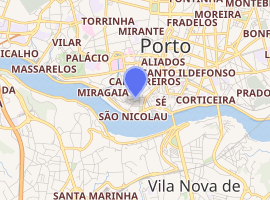Palacete de Belomonte
The Palacette of Belomonte (Portuguese: Palacete de Belomonte/Palácio de Belomonte/Casa dos Pacheco Pereira) is a former-residence on Rua de Belomonte, in the civil parish of Cedofeita, Santo Ildefonso, Sé, Miragaia, São Nicolau e Vitória, in the northern Portuguese city of Porto.
| Palacette of Belomonte | |
|---|---|
Palacete de Belomonte | |
The front facade of the Belomonte | |

| |
| General information | |
| Type | Palacette |
| Architectural style | Baroque |
| Location | Cedofeita, Santo Ildefonso, Sé, Miragaia, São Nicolau e Vitória |
| Country | |
| Coordinates | 41°8′33″N 8°36′58″W |
| Opened | 18th century |
| Owner | Portugal |
| Technical details | |
| Material | Granite |
History
Up until the 18th century, the building functioned as the Colégio de São Sebastião (College of São Sebastião), and the Banco Aliança.[1]
The current building was constructed in the 18th century.[1]
By the middle of the 19th century, it was one of the principal meeting places associated with the Portuense high society.[1] Following the death of João Pacheco Pereira (then owner) the building was obtained by collateral line of the family, but with time, fell into decline.[1]
In 1888, the residence was bought by the Companhia de Ferro Através de África (Iron Company Through Africa), and the family coat-of-arms was removed, to be replaced by a royal coat-of-arms.[1]
Architecture
.jpg)
The building is flanked by a three- and two-storey building, located with a long narrow area between the Rua de Belomonte and Rua do Comércio do Porto., near the Palace of São João Novo.[1] The long symmetrical, rectangular Baroque manorhouse is marked by a two-storey frontispiece and Mansard roof, with undulating cornices and sculpted granite stone.[1]
The long building consists of a simple volume covered in Mansard and roof tile, with its principal facade oriented towards the roadway.[1] This facade is oriented towards the north, consisting of a symmetric and subdivided form in five parts, divided by six pilasters. On the extremes of the building are accented doorways, surmounted by coat-of-arms and oculi, broken by granite cornices that run the length of the building.[1] The ground floor consists of rounded window door, repeated above by windows topped with undulating forms.[1] Over the Mansard roof are six pinnacles in masonry aligned by pilasters.[1] The rear facade is circled by a long, wide varanda between the two corps, while the front facade includes several varandas with ironwork over plinths in granite and surmounted by pinnacles.[1]
The interior space includes a rectangular entranceway with slabs and granite staircase with balustrades.[1] Over the staircase is an elliptic candelabra, surrounded by stucco walls decorated in carved flourishes.[1] The ceiling of the entranceway in wood leads to rooms that plastered and decorated with paintings.[1]
References
Notes
- Sereno, Isabel (1996), SIPA (ed.), Palacete de Belomonte/Palácio de Belomonte/Casa dos Pacheco Pereira (IPA.00005495/PT011312130095) (in Portuguese), Lisbon, Portugal: SIPA – Sistema de Informação para o Património Arquitectónico, retrieved 10 November 2016
Sources
- Guia de Portugal (in Portuguese), IV, Coimbra, Portugal, 1985
- Porto a Património Mundial (in Portuguese), Porto, Portugal, 1993
- Quaresma, Maria Clementina de Carvalho (1995), Inventário Artístico de Portugal. Cidade do Porto (in Portuguese), Lisboa, Portugal